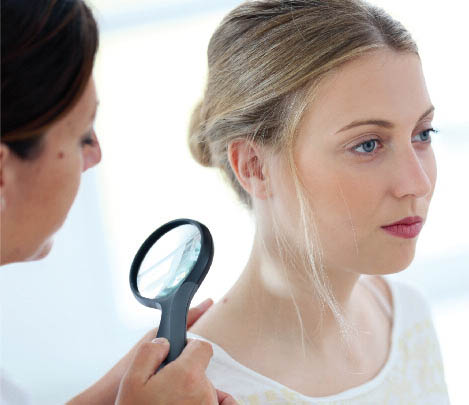

Early detection of skin cancer plays a pivotal role in successful prevention strategies. Imagine a future where skin cancer is less prevalent due to proactive measures. Skin cancer, encompassing various forms such as melanoma, basal cell carcinoma, and squamous cell carcinoma, is a serious health concern. The majority of skin cancers are treatable when detected early, highlighting the importance of early detection. This article explores the crucial role of early detection in skin cancer prevention, encompassing self-exams, professional checkups, and preventative strategies. We will discuss the various forms of skin cancer and their associated risks, highlighting practical steps readers can take to protect themselves. This article will be divided into several sections: understanding skin cancer, identifying risk factors, preventive measures, and the importance of regular screenings.
Understanding Skin Cancer: Types and Risk Factors
Different Types of Skin Cancer
Skin cancer isn’t a single disease but a group of cancers that develop in the skin’s cells. Melanoma, the most serious type, arises from melanocytes (pigment-producing cells) and can spread rapidly to other parts of the body if not detected early. Basal cell carcinoma and squamous cell carcinoma are less aggressive types of skin cancer, often appearing as sores or lesions. Understanding these different types is crucial for effective prevention and treatment.
Risk Factors
Exposure to ultraviolet (UV) radiation from the sun is the primary risk factor for skin cancer. Prolonged sun exposure, especially during peak hours, damages the skin’s DNA, increasing the likelihood of cancerous mutations. Fair skin, a family history of skin cancer, and a weakened immune system can also increase a person’s risk. Other factors like certain medications or exposure to harmful chemicals also play a role.
The Importance of Self-Skin Exams
Related Post : Common Skin Conditions That Often Go Misdiagnosed
Regular Self-Exams: A Crucial First Step
Regular self-skin exams are a proactive approach to early detection, enabling individuals to identify potential issues early on. Learning to recognize common skin cancer signs can significantly improve outcomes. Early detection significantly improves treatment success rates, often resulting in less invasive procedures and better prognoses.
Recognizing Potential Warning Signs
Skin changes can often be early indicators of skin cancer. Be observant of any new moles or changes in existing ones. Pay attention to sores that fail to heal, scabs that persistently bleed, or areas of thickened or discolored skin. Notice if a mole changes in size, shape, color, or if it has irregular borders. Regular self-exams empower you to identify these potential warning signs.
Professional Skin Checks and Preventive Measures
Dermatologist Consultations: Professional Expertise
Regular visits to a dermatologist are vital for skin cancer prevention. A professional examination by a dermatologist provides a detailed assessment of the entire skin, including hard-to-reach areas. Dermatologists can identify early signs of skin cancer that might be missed by self-exams, significantly enhancing the chances of early intervention.
Sun Protection and Protective Clothing
Protecting yourself from excessive sun exposure is essential. Use broad-spectrum sunscreen with an SPF of 30 or higher daily. Wear protective clothing, including hats with wide brims, sunglasses, and long sleeves, to reduce direct sun exposure, especially during peak sun hours. Seek shade whenever possible.
Lifestyle Factors and Comprehensive Prevention
Diet and Skin Health
A balanced diet rich in antioxidants and vitamins can contribute to overall skin health, supporting its natural defense mechanisms. Fruits, vegetables, and foods rich in Vitamin C and E may contribute to healthier skin, potentially reducing the risk of skin damage.
Avoiding Smoking and Maintaining Healthy Weight
Smoking significantly increases the risk of skin cancer and can negatively impact the effectiveness of treatment. Maintaining a healthy weight through a balanced diet and exercise regimen can contribute to overall health and, potentially, reduce risk factors.
The Value of Regular Screenings
The Role of Skin Cancer Screenings
Regular skin cancer screenings are critical, as early detection significantly increases treatment success. Screenings allow early detection of skin abnormalities, regardless of self-examination findings. Screening often includes a detailed review of the entire skin surface by a dermatologist.
Implementing a Personalized Prevention Strategy
Personalized prevention strategies are crucial for effective skin cancer prevention. Consult a dermatologist to discuss your unique risk factors and tailor a plan that addresses your individual needs and risk profile.
In conclusion, early detection of skin cancer is paramount for successful prevention and treatment. By understanding the crucial role of self-exams, professional checkups, and preventive measures, individuals can significantly reduce their risk. Proactive steps like sun protection, healthy lifestyle choices, and regular dermatologist visits are all vital components of a comprehensive approach to skin cancer prevention. Schedule a consultation with a dermatologist today to discuss your personal risk factors and create a tailored prevention plan.